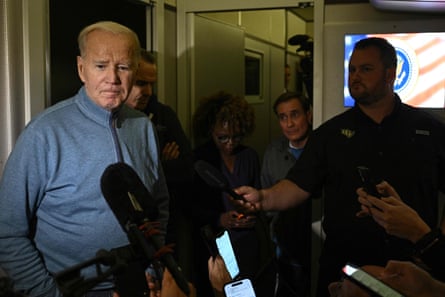Aid agencies have warned that the help set to arrive in Gaza could be too little too late for many of the territory’s desperate population as preparations were being made for a small convoy of lorries carrying humanitarian aid to enter Gaza on Friday, under a deal between the US, Israel and Egypt.
The US president, Joe Biden, brokered an agreement during his one-day visit to Israel on Wednesday for an initial convoy of 20 trucks to pass through the Rafah crossing from Egypt to Gaza on Friday. Under conditions demanded by the Israelis, further consignments of relief supplies would be dependent on whether the first delivery was distributed without Hamas involvement.
The aid delivery planned for Friday will take place under the shadow of a threatened ground offensive by Israeli troops massed along Gaza’s borders.
Israel’s defence minister, Yoav Gallant, addressed the troops on Thursday, telling them: “You see Gaza now from a distance, you will soon see it from inside. The command will come.” The Israeli prime minister, Benjamin Netanyahu, told his visiting British counterpart, Rishi Sunak: “This is our darkest hour.”

Aid agencies have said delays in agreeing the relief shipment had undoubtably cost the lives of Palestinians who have been under bombardment and total blockade since the 7 October Hamas attack on Israel that killed 1,400 people. They also said it was a pitiful amount for a population of 2.3 million who were heavily dependent on humanitarian assistance even before basic supplies, water, fuel and electricity were cut off. More than 3,000 people have been killed in the past 12 days, according to Gaza officials.
The emergencies director of the World Health Organization , Michael Ryan, said aid needed to get in “every day”, and called the initial convoy of 20 trucks “a drop in the ocean of need right now”.
On a visit to Cairo, the UN secretary-general, António Guterres, said: “We need food, water, medicine and fuel now. We need it at scale and we need it to be sustained, it is not one small operation that is required.”
Sunak welcomed the decision to allow aid into Gaza, saying he knew Israel was “taking every precaution to avoid harming civilians in direct contrast to the terrorists of Hamas”.
The threat of a ground assault on top of the constant aerial bombardment, however, threatened to cut off any lifeline established through Gaza at any moment.
“There will be many injured who will lose their lives if sufficient fuel, medical supplies and life-saving aid is not delivered to hospitals in Gaza which are full of injured civilians from the continuous bombing and Israeli airstrikes,” said Riham Jafari, the communications and advocacy coordinator at ActionAid Palestine.
“Insufficient aid will cause health disasters and starvation as patients with chronic diseases and pregnant women and their infants will be unable to receive the medical care and nutrition they need, and this will endanger their lives. We know that the 20 trucks of aid currently promised is simply not enough.”
Talking to reporters onboard Air Force One on the flight back from Israel to the US, Biden made it clear he believed the main achievement of his trip was to persuade Israel’s war cabinet to give a green light – with caveats – to humanitarian relief deliveries across the Egypt-Gaza border.
Biden said he had also spoken to the Egyptian president, Abdel Fatah al-Sisi, who had agreed to reopen the Rafah crossing to allow the 20 lorries to enter Gaza. The US president said roads near the border would need repairs after they were damaged in Israeli strikes, but that aid could begin reaching the territory by Friday.
“This has been a very blunt negotiation I’ve had,” Biden said. “We want to get as many of the trucks out as possible. There’s, I guess, 150 or something there. Not all of them will go the first tranche. If there’s a second tranche – see how it goes.”
He said Sisi had “agreed that what he would do is open the gate … to let up to 20 trucks through to begin with”.

“They’re going to patch the road. They have to fill in potholes to get these trucks through. And that’s going to occur; they expect it’ll take about eight hours [on Thursday]. So, there may be nothing rolling through … probably until Friday,” Biden said. “For this purpose. Not to allow a lot of people out, but to open it up for this purpose.”
However, Biden added: “If Hamas diverts or steals the assistance, they will have demonstrated once again that they have no concern for the welfare of the Palestinian people, and as a practical matter it will stop the international community from being able to provide this aid.”
The Egyptian foreign minister, Sameh Shoukry, told Al Arabiya TV that supplies would go in under supervision of the UN. Asked if foreigners and dual nationals seeking to leave would be let through, he said: “As long as the crossing is operating normally and the [crossing] facility has been repaired.”
An estimated 500 Palestinian Americans and thousands of other Palestinians with foreign nationality have been hoping to leave Gaza through the Rafah gate. Biden said that alongside ensuring humanitarian aid deliveries, making sure as many Americans as possible “who wanted to get out, could get out” had been his priority in visiting Israel.

Humanitarian organisations have stockpiled life-saving supplies on the Egyptian side of the border, waiting for the crossing to open. The UN aid chief, Martin Griffiths, told the UN security council on Wednesday that the organisation sought to bring aid deliveries to Gaza back to 100 trucks a day, the level before the Israel-Hamas conflict.
Griffiths told the security council: “There is simply nowhere to go for civilians to escape the destruction and privation, both of which grow by the hour as missiles continue to fly and essential supplies, including fuel, food, medical items, water run low.
“Due to the scarcity of water, UNRWA [the UN relief agency] in some locations … is being forced to ration down to providing one litre of water per person per day. Bear in mind that the minimum by international standards should be 15 litres, and they’re getting one – and they’re the lucky ones.”
Biden said he had urged restraint during his visit to Israel. Israel has amassed a huge force around Gaza and told the population of northern Gaza to move to the southern half of the territory in advance of a widely expected ground invasion.

The Biden administration fears a large-scale ground assault will lead to further mass civilian casualties, possibly trigger a major cross-border offensive from the Iranian-backed Hezbollah militia in Lebanon, and fall short of the Israeli war aim of eliminating Hamas.
Biden bluntly denied on his return flight an Israeli press report that the US had promised to fight alongside Israeli troops if Hezbollah attacked. “Not true,” the president said. “That was never said.”
John Kirby, the spokesperson for the US national security council, said: “As we’ve said before, there’s no intention to put US boots on the ground in combat.”
While in Israel, Biden expressed grief for the Palestinians who died in the explosion at al-Ahli Arab hospital in Gaza but said the US agreed with Israel on the blast’s cause. “Based on the information we have seen to date, it appears as a result of an errant rocket fired by a terrorist group in Gaza,” he said. The Israel Defence Forces have said the cause was a rocket fired by Palestinian Islamic Jihad, while Hamas says the blast was caused by an Israeli airstrike.
The explosion at the hospital and its heavy death toll led to the cancellation of what was supposed to be the second leg of Biden’s Middle East peace mission: a meeting in Amman with Sisi, Jordan’s King Abdullah and the head of the Palestinian Authority in the West Bank, Mahmoud Abbas.
Sunak, arrived in Israel as part of a regional visit in an effort to de-escalate the Israel-Gaza conflict, his office said.

At a joint press conference with Netanyahu, Sunak said Israel had gone through something that “no country, no people should have to endure – least of all Israel”. He also thanked the Israeli government for its decision to announce the opening up of humanitarian routes into Gaza.
More than 1 million Palestinians, roughly half of Gaza’s population, have fled their homes since the war began. Those fleeing the north to move south have crowded into UN schools or the homes of relatives.
The Gaza health ministry said 3,478 people had been killed in Gaza since the war began and more than 12,000 wounded, mostly women, children and elderly people.
More than 1,400 people in Israel have died, mostly civilians killed during Hamas’s deadly incursion on 7 October.
World - Latest - Google News
October 20, 2023 at 12:49AM
https://ift.tt/gove3Wf
Aid convoy set to enter Gaza a ‘drop in the ocean of need’ says WHO - The Guardian
World - Latest - Google News
https://ift.tt/hbJYdev

No comments:
Post a Comment